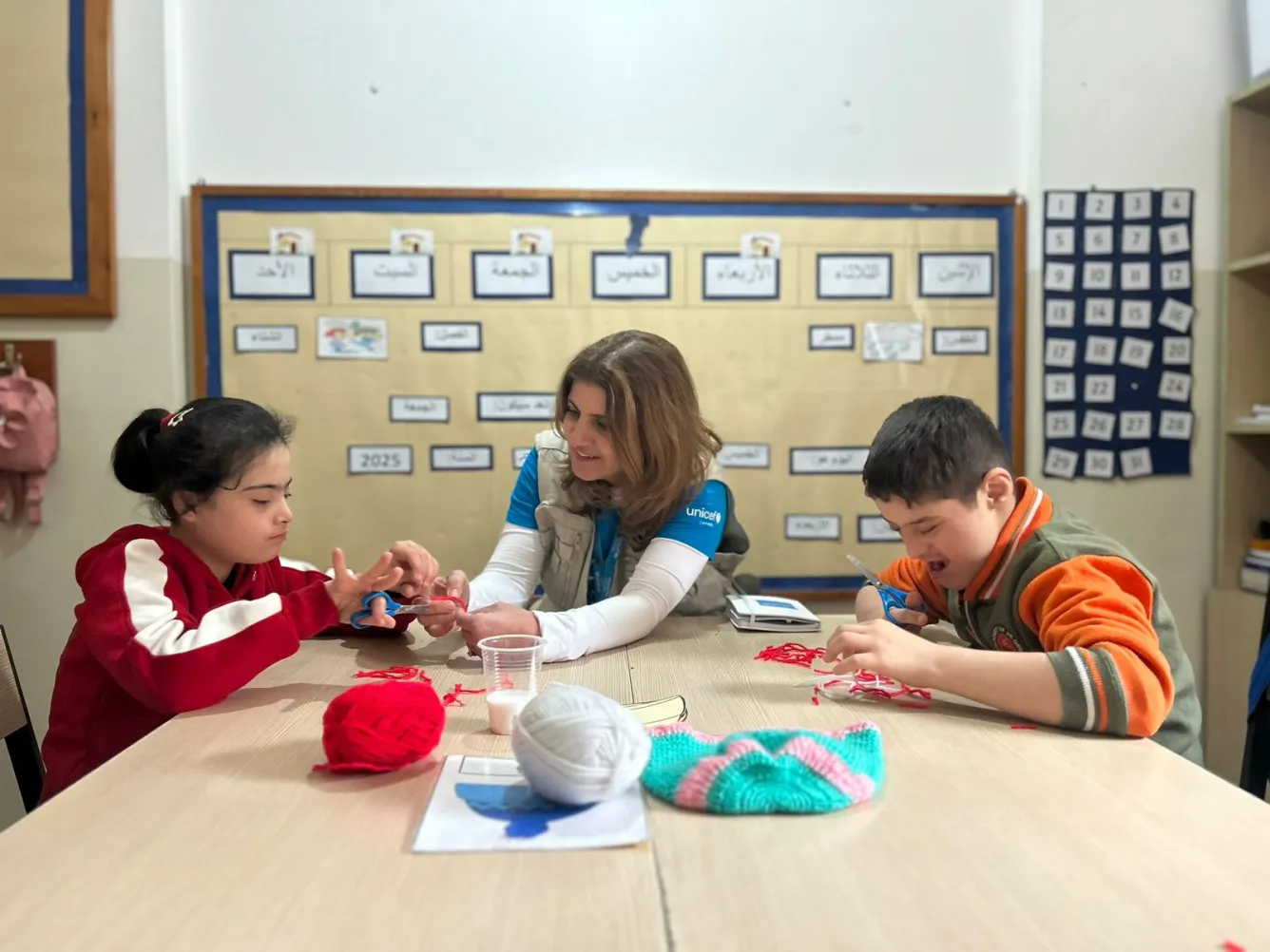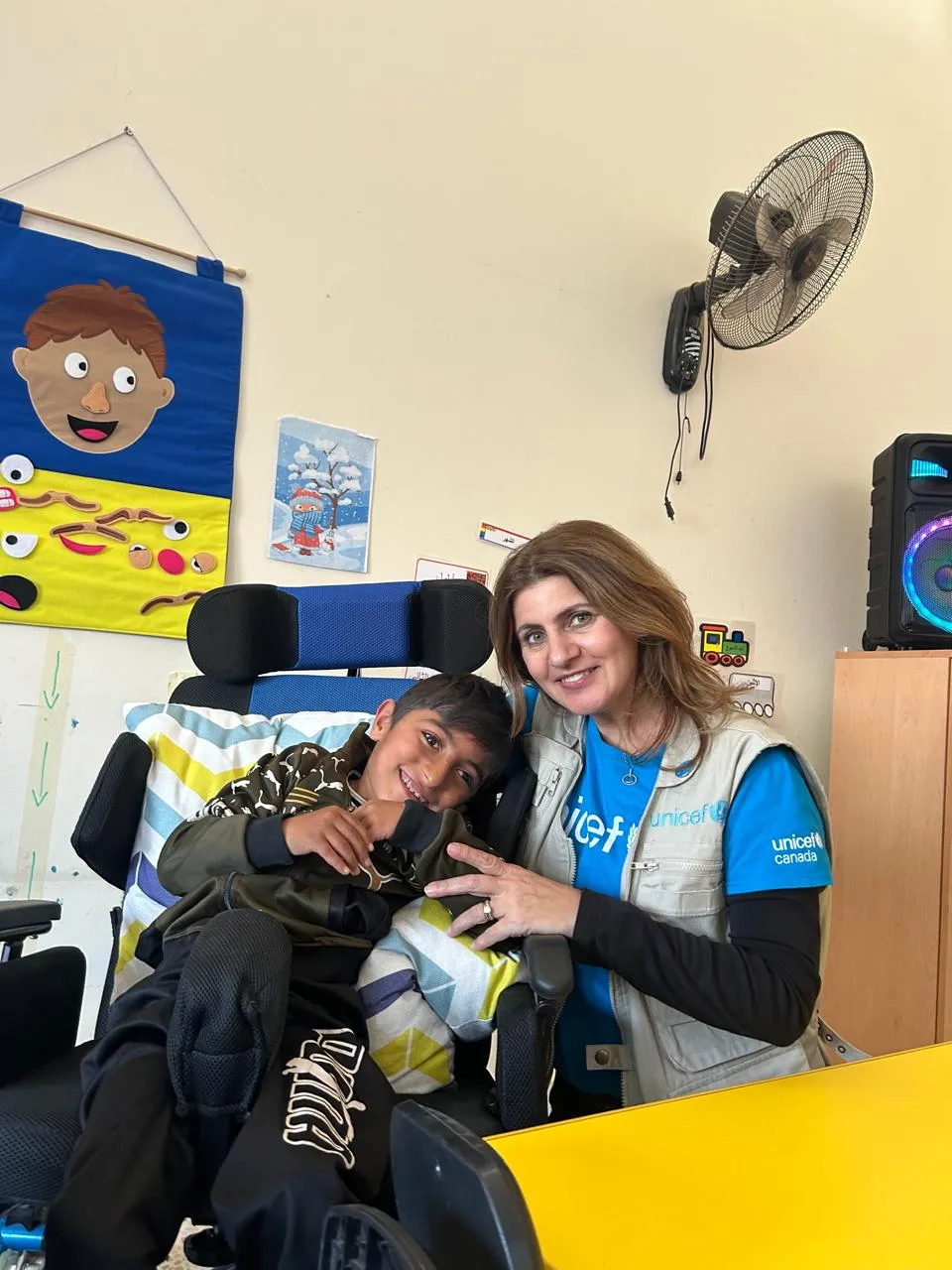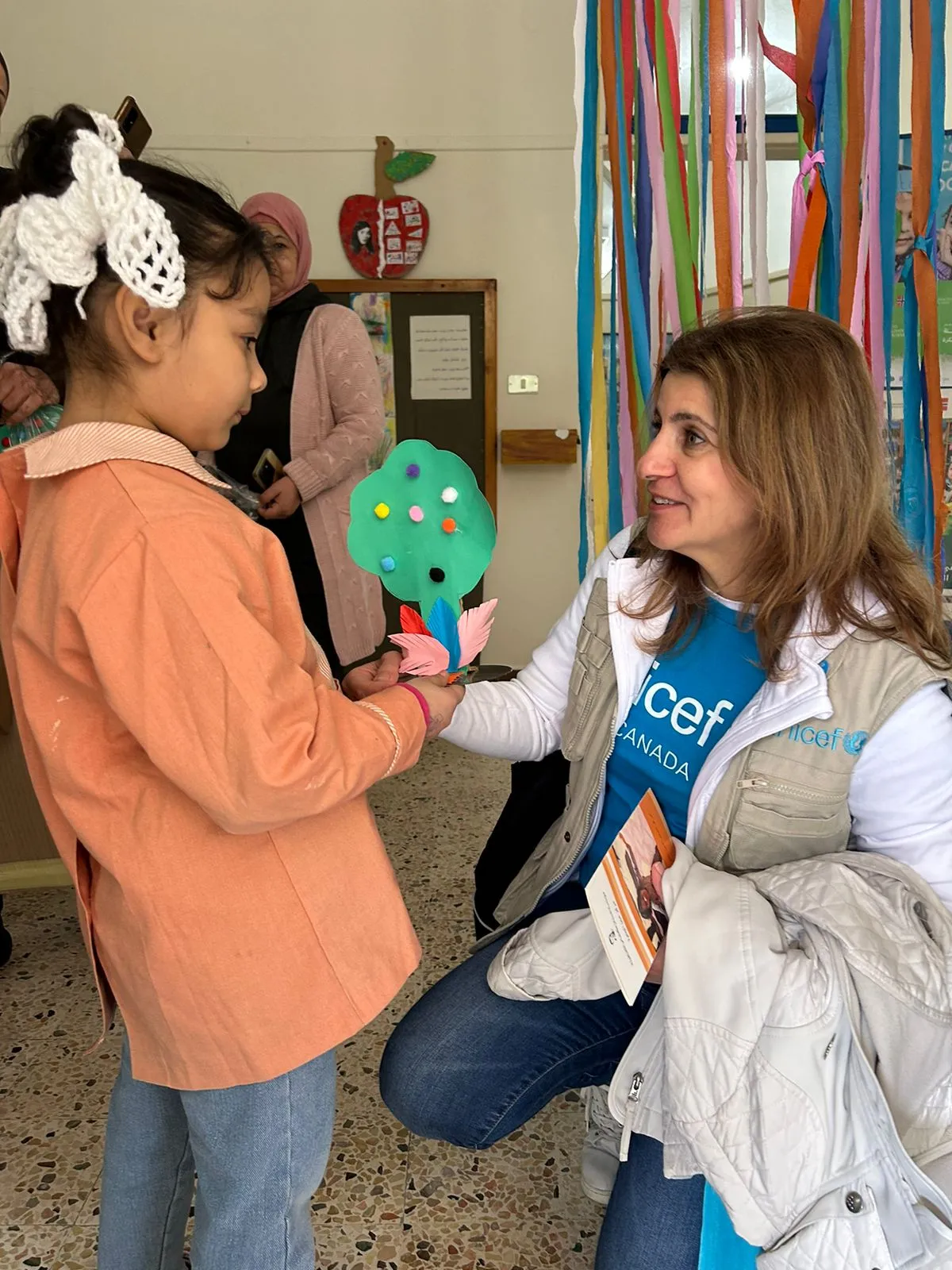Lebanon in War and Peace: Reflections from My Volunteer Mission
UNICEF Canada Ambassador Bayan Yammout was born in Beirut, Lebanon during the civil war, where she spent 17 years living in a war zone. Bayan witnessed first-hand what it means to be a child impacted by conflict – hiding in underground shelters, missing school, and living through the effects of being internally displaced. searching for water and feeling the anguish of losing family members.
Now a special education teacher in Toronto, Bayan has had opportunities to share her knowledge and expertise with others in Ontario and abroad on working with children with disabilities.
Most recently she was invited by the UNICEF Lebanon Country Office to visit with staff from its many partners to see how children with disabilities are being served in the country and what more we can do to build capacity and promote inclusion.
Follow along as she shares her reflections from her trip.
JOURNAL ENTRY #1
January 17, 2025
Pearson Airport, Toronto, Ont.
I am at Pearson Airport, ready to fly to Lebanon.
This is my second attempt to travel to Lebanon. I was meant to go in October, but it was cancelled at the last minute due to safety concerns. But just a few weeks ago, Lebanon entered into a much-needed 60-day ceasefire agreement.
Holding my boarding pass in my hand, I am on an emotional rollercoaster. On one hand, I am excited to be getting to work with the UNICEF Lebanon team and share my knowledge and expertise to support their work with children with disabilities. On the other hand, I am worried about what I will see in Lebanon. After heavy bombardment, entire neighbourhoods and villages have been levelled to the ground. Many children have been injured or killed, and over 400,000 children have been displaced.
I know that once I land in the country, seeing these scenes of destruction will be painful and triggering. They will take me back to the war I survived throughout my childhood in Lebanon.
I know it will be a tough mission, but I know it will be worth it. I’m so inspired by the dedication of UNICEF staff and their partners, all who are risking their lives to meet the needs of these children under difficult conditions.
I’m not quite sure what I will see, but I bet it will be life changing.
JOURNAL ENTRY #2

January 23, 2025
Beirut and Tripoli, Lebanon
Well, I arrived safe and sound, but the first few days have been hard—as expected.
Walking the streets of Beirut and seeing footprint of war is heartbreaking. At the same time, talking to the people and witnessing their determination to rebuild and move on is quite remarkable.
I have known Lebanon in war and in peace. This country never fails to impress with its ability to stand up on its feet despite the many crises and challenges it’s facing.
Yesterday I met with staff from UNICEF’s Lebanon Country Office. Children with disabilities in Lebanon face stigmatization as well as immense social, physical, and economic barriers to education and care. Through disability awareness campaigns and training sessions aimed at parents, caregivers, teachers, and the community at large, they are advocating tirelessly for better inclusion of children with disabilities in public schools and local communities. But this isn’t the only issue they’re focused on.
UNICEF’s staff in Lebanon face a mountain of challenges in addition to the stress caused by war, the current economic crisis, and even after the aftermath from the Beirut port explosion in 2020. I‘m in complete awe of their ability to keep working.
The next day, I met with the First Step Together Association—FISTA for short—in Tripoli. FISTA has three sites serving children and youth with mild to severe disabilities and children with autism in Lebanon’s north.
After speaking with staff I was shocked to learn that children with disabilities here often stay home 24/7. Even those who are lucky to attend special programs can attend only for three half days a week due to high demand and not enough funding to cover operating costs. This is having a devastating effect on their overall development and skills building. FISTA itself gets about 10 referrals each week and they have a long list of children with disabilities on their waiting list. UNICEF provides training to staff and funding for 275 children with moderate to severe disabilities. This is far from what is actually needed.
But there are moments of brightness. I think of the children I just met, like Lynn who is learning embroidery, Joseph picks olives to make soap, Batoul who was busy with arts and crafts, and Issa who was learning about emotions. All of them feel they belong, and their unique experiences and skills are appreciated.
It’s remarkable to hear how FISTA’s staff have stepped up through the most recent conflict. During a period of bombardment, Tripoli received many displaced families from other parts of the country. They were housed in public schools turned into temporary shelters meaning FISTA’s centres had to close. Instead of staying home, FISTA’s teachers decided to support children in those shelters, especially those who have disabilities and medical conditions. With UNICEF’s funding and support from Lebanon’s Ministry of Social Affairs, they offered psychosocial activities to children whose lives have been turned upside down due to the conflict and displacement.
Those teachers, despite being impacted by the war and the multiple crises, were working around the clock to offer some normalcy to children experiencing unforgettable trauma.
JOURNAL ENTRY #3

January 30, 2025
Bednayel, Lebanon
Today was a bit of an early start. After spending the past few days at FISTA in the North observing and assisting teachers then leading hands-on workshops, we departed the UNICEF Lebanon office for Bednayel in the Beqaa region. We had to stop on the way after we unexpectedly learned we needed security clearance. We suspect it was due to an event the night before, but that’s Lebanon right now—the security situation can change by the hour since the ceasefire has been fragile. Fortunately we weren’t stopped for long.
Along the way, billboards with warning about leftover explosives from recent bombardments gave me the chills. Soon enough, the car got quiet as we entered a new area on the way to Bednayel that had been hit hard by bombing. The grim scenes of destruction reflect the immense suffering this community has endured. What once was a beautiful two-story house is now a pile of rubble. We could still see pieces of people’s furniture—mattresses, curtains, carpets, a crunched-up stove, along with kids’ toys, and books.
Eventually we arrived at a Makani centre run by The Lebanese Organisation for Studies and Training, or LOST. The scene was no less jarring than what we had just witnessed. This centre—a place that provides care and happiness to children—was next to a completely destroyed house. This is how close danger is. Now when children arrive, they pass by this scene of destruction and are reminded of the traumatic experience they are trying to recover from.
I know that feeling. I remember during the war, when the fighting temporarily stopped and we were allowed to go out to play, we used to pass scenes like this. We never had time to process it—our priority was to take advantage of the time to go out and play. That’s just resilience.
LOST runs Makani centres in the Baalbeck Governorate. These multi-service community centres offer non-formal education and integrated services for marginalized children and caregivers. At the centre in Bednayel, children with mild disabilities attend inclusive programs inside regular classes, while about 15 children with moderate to severe disabilities attend specialized program five days a week. The program focuses on promoting independence and communication skills, and building basic early literacy and numeracy skills. Therapists work together with a teacher and an educational assistant to set therapy goals and monitor progress.
The environment inside the centre here helped me—at least briefly—forget some of the destruction I had just witnessed. I saw happy children, smiling and engaged in fun activities like painting and singing. They also participate in individual psychology, speech therapy, physiotherapy, and occupational therapy sessions. They are comfortable. They are making friends. They feel safe, valued, and appreciated. They know they matter.
JOURNAL ENTRY #4

February 5, 2025
Beirut, Lebanon
This past Friday, January 31st was a very special day as we made a surprise visit to the Ain El-Hilweh Palestinian refugee camp in south Lebanon. Ain El-Hilweh is home to over 64,000 people, including, Syrian refugees, and Palestine Refugees from Syria. It’s supported by UNICEF and a host of partner agencies. Many here face high levels of multigenerational poverty and vulnerability.
I felt safe travelling with UNICEF. Our security pass gave us very limited time inside the camp, which was fine as our main purpose was to learn about Ghassan Kanafani Kindergarten, a UNICEF-supported inclusive educational centre for young children with and without disabilities.
After going through check points and security checks, we entered the camp. It was an organized chaos—people everywhere, children running around, signs of poverty. But the Ghassan Kanafani Centre was a real gem. It’s a truly inclusive environment for children and youth, offering early childhood education, rehab services, creative art program and has a library. We went form class to class, watching children participate in music, play, dance and physical enrichment activities. In one class, young children with visual impairment were learning braille.
Most of the children here were born inside the refugee camp. These well-designed inclusive programs nurture their sense of identity and culture which helps them develop belonging and pride.
Once our security pass has expired, it was time to leave. On my way out, two children offered me a little paper tree they made as a thank you, as well as an art piece created by students in the inclusive art program. It’s now sitting in my living room. It’s a reminder that magic can happen under the most difficult conditions when UNICEF, partner agencies, and the community work together.
Visiting Ain El-Hilweh gave me a boost before heading back to Makani Centre in Bednayel to run workshops to the education and therapy team over the next few days. At Makani, I also had the chance to volunteer in the classroom with Arzeh, a special education teacher. The children I met from Arzeh’s class all had unique personalities.
I met six-year-old Ali, who communicates mostly with gestures and facial expressions and loves eating spicy chips. When I asked him why, he smiled and proudly told me that eating spicy chips make him strong!
I met Abdulla, who has autism. He can read simple sentences in English and loves going to his therapy sessions. I strongly believe he would thrive in a class among children without disabilities.
And I met Mariam, who lives with a visual impairment and is non-verbal. Her father told me that he has seen a real difference since Mariam started attending school. He shared his hope for UNICEF to expand its program to be able to accommodate her two older siblings who also have disabilities. I wish I have the power to change this bitter reality.
Poverty, hunger, stigma, and no access to accessible transportation or specialized equipment are only some of the challenges these children face. UNICEF and LOST are advocating for sustainable funds to ensure children’s rights, safety and dignity are respected.
My sessions with the staff and the opportunity to share inclusive practices and resources from Canada was rewarding. Their level of dedication, professionalism, and creativity is outstanding.
One more story before I sign off. The other day I was travelling with Mostafa from LOST—he’s been helping me travel around the area—and he stopped by a house to drop off winter clothing kits to a family. This is something my parents would do back in the 80’s. The joy I saw in the eyes of the children who received the kits was heartwarming. It made me think: Being a humanitarian is more than just getting a job done, for Mostafa, it was keeping children in his own town warm. Whether it was my parents 35 years ago, or Mostafa that day, it’s just one example of the hope constantly delivered by UNICEF.
JOURNAL ENTRY #5
February 8, 2025
Toronto, Ontario
Here I am, back in Canada, feeling energized to tell everyone about the profound impact that UNICEF and partners have on the life of children in Lebanon and their families.
There is so much to reflect on.
However, the one thing I felt so strongly as I sat in the Beirut airport to head home was gratitude.
I’m grateful for the opportunity to follow in my parents’ footsteps to do my part and leave a positive impact.
I’m grateful for the generosity and kindness of everyone I met, especially Hiba and the Equity & Inclusion team at UNICEF Lebanon for organizing my mission, and Jeff from the UNICEF Canada team who stayed in contact with me and helped with my social media posts.
I’m grateful for the security team and the drivers who kept me safe on the roads.
I’m grateful for the teachers who welcomed me with open arms, for the children who allowed me to join their classroom and let me witness all the fun they have at school.
I’m grateful for the opportunity to look in those children’s eyes and say to them “you matter,” that there are many people here in Canada who think of them and want to help.
And I’m grateful that, even in a world that is more divided than ever, UNICEF and partners put children’s rights front and centre no matter who they are or where they live.
Many Canadians want to see how their donations are making real difference.
They should know that each donation to UNICEF leads to many happy stories. These stories depend on the sustained generosity of donors, so programs can expand and reach more children especially those with disabilities.
Because no child chooses to have a disability and no child chooses to live in war or poverty.
